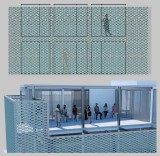The term Fast Fashion, has been established by companies that promote and sell clothes at very low prices. The reduced quality of clothes, the increase of purchases and the speed of their replacement, create a large amount of leftovers that are difficult to be recycled and reused.
This architectural thesis is divided into three sections: narrative, functional organization and architectural design. It starts with an analysis of the term Fast Fashion through a theoretical framework and examples of contemporary recycling technologies.
This is followed by a research and documentation of the buildings where the intervention is proposed. The search is done by observing buildings in the center of Volos, a city with an important industrial history in the textile sector. Two buildings that piqued my interest are the abandoned buildings on Dimitriados and Rozou streets, two buildings that although they have a history of centuries, they have been erased and forgotten over time, as their condition. Through narratives of the owners, the residents of Volos, personal search and imprinting, a complete documentation of the history and drawings of these two buildings is achieved. The intervention continues throughout the entire city block in order to present new functions, preserving the existing ones, as well as to emphasize new recyclable materials in terms of architectural approach and construction.
Through necessary searches and infographics, the building program is created, which can approach the interested public of the city of Volos, and more. The aim is to showcase new works and highlight new techniques that turn the growing waste or unnecessary products into a kind of sustainable commodity, i.e. how waste clothing becomes a resource for garment production, thus reducing the impact of textile waste. In this way, a new business model of investment is approached that combines fair trade with social benefit. Finally, the modernization of older functions of the block is also a key objective.







